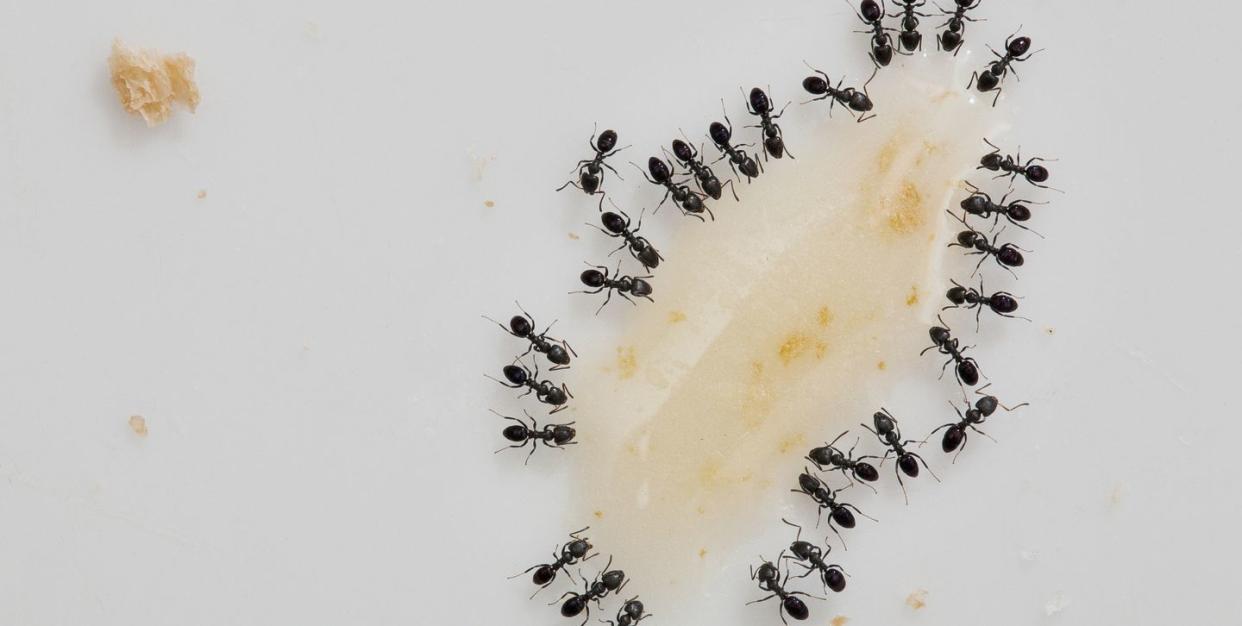These Expert-Approved DIY Traps Will Actually Kill Ants in Your Home

It isn’t exactly ideal when you spot a line of ants traipsing through your place or hanging out on your kitchen counters. After all, you live there and, last you checked, you didn’t sign up for pests as roommates.
If you have kids or pets, though, it’s understandable that you might be wary of whipping out more conventional ant-killing methods, like pesticide-ladened sprays and bait traps.
So, what other methods can help kill them off? Below, pest experts explain why these tiny critters can be tough to eradicate, and the DIY ant traps that will actually get rid of them.
Why is it so hard to get rid of ants?
“Ants typically build large colonies, sometimes in hard to reach places,” explains board-certified entomologist Desiree Straubinger, market technical director for Western Exterminator. “It becomes a numbers game where even if you find the colony and destroy it, there will always be ants that weren’t there at the time that are not killed.” Ants also tend to move those colonies around, she says, so it can be hard to find them.
And those colonies can be sizable. “Ants are difficult to control because, while it is easy to kill the workers, you usually need to kill the queen to get rid of the entire colony,” says Ben Hottel, Ph.D., technical services manager at Orkin, LLC. “These queens can be hidden underground or in void areas in a structure and are difficult to reach with most pesticides.”
On top of that, these pests can also be picky, which can mess with your ability to lure them into traps. “Ants are extremely particular in what they will or will not eat and change their behavior based on seasonal availability of food sources and other factors in the environment,” Straubinger says. “What they want to feed on today can differ than what they will feed on tomorrow, making the elimination much more scientific.”
Finally, ants also leave a trail of pheromones, i.e. chemicals that trigger a response in fellow ants, prompting other ants to follow along the same path, says entomologist Roberto M. Pereira, Ph.D., an insect research scientist with the University of Florida. So, where one ant goes, more will likely follow.
What are the best DIY ant killers that actually work?
Traps generally need two main components, according to Pereira: Something that attracts the ants and an element that keeps them from escaping or takes them out. Toxins can be a part of this, including “very simple ones” like boric acid (a compound that’s toxic to many pests). With that in mind, you might be able to trap ants with these simple methods at home:
✔️Mix boric acid and powdered sugar.
Try combining three parts powdered sugar with one part boric acid. The sugar will lure the ants in and the boric acid will kill them, Pereira says. Liquid is better—adult ants prefer to drink their food—so water this stuff down a little. “I recommend this to a lot of people,” Pereira says.
Huge caveat: While it’s not a traditional pesticide, boric acid can be dangerous for kids and pets if ingested, so make sure you put it out of reach of little hands and paws.
✔️Combine baking soda and powdered sugar.
This is similar to the boric acid trap—just combine the baking soda (a.k.a. sodium bicarbonate), water, and powdered sugar, and leave it out. Pereira says it may not work as well as the boric acid, but it is a safer option if you are worried about pets and children.
✔️Leave out a cornmeal paste.
Some ant species may be into cornmeal paste. While you might read online that cornmeal will clog up an ant’s insides, Pereira says this isn’t true. That said, if you have cornmeal handy, you can try making a paste with it and adding boric acid to try to kill the ants, Straubinger says.
✔️Spray the ants with a soapy mixture.
Combine water, soap, and oil, and either leave it out in a dish or spray it directly on ants. The ants will be attracted to the oil, but the soap will kill them. (“Oil does attract some ants, but not necessarily all ants,” Pereira says.) Another perk: Soap helps destroy the scent trail left by ants, Hottel says.
Persistence is key with this stuff. “You have to be putting this out all the time,” Pereira says. He recommends switching out your trap with new ingredients every day or so for a week or more.
When to call a pro about your ant problem
If you’ve experimented with the DIY ant killers above, been diligent about cleaning up spills and crumbs, tried these other pro tips on how to get rid of ants, and they are still coming back, Hottel says it’s probably time to rope in a professional for help. “Keeping ants out of homes is an ongoing process, not a one-time treatment,” he says. “Since every home is different, your provider will design a unique program for your situation.”
If you’re having an ant problem, Straubinger says you shouldn’t sit on it for too long. Calling early will save you “from a lot of trouble down the road,” she says.
Support from readers like you helps us do our best work. Go here to subscribe to Prevention and get 12 FREE gifts. And sign up for our FREE newsletter here for daily health, nutrition, and fitness advice.
You Might Also Like

